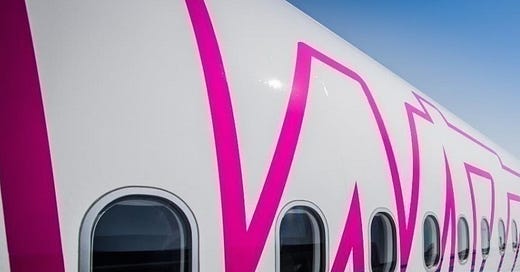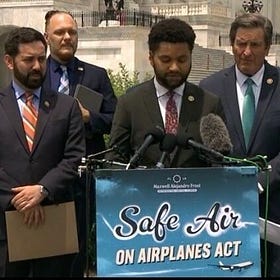FPU Romania /Europe has called on the European Commission to launch an immediate investigation into the lack of accountability that prevents state authorities from exercising authority over airlines and multinational companies such as Wizz Air. This situation raises serious questions about intra-European jurisdiction.
This follows numerous "fumes" reports. Previously the Romanian Labour Inspectorate had concluded that Wizz Air had failed to notify the relevant authorities of events involving toxic fumes. As a result, the authorities fined the airline and ordered an investigation into the employer's non-compliance.
In 2023, low-cost airline Wizz Air experienced a series of fume incidents caused by engine oil leaking into the air conditioning system of its Airbus A320/A321 aircraft. The story was published on Pro TV, Romania's largest news channel. For the first time, crew members dared to speak out and draw attention to a phenomenon that has the potential to endanger the health and safety of aircrew and passengers. The investigation team documented several situations that led to flight delays or cancellations, highlighting the risks associated with toxic fumes on board aircraft… → read the FPU Article by Mircea Constantin here .
When toxins are released into the environment by any other industry or are detected in public buildings, trained professionals in hazmat suits immediately crawl around the hastily cordoned-off sites, testing the air and taking samples using specialized equipment. Not so in aviation. Toxic gas-like fumes are emitted in aircraft daily. They occur regularly worldwide and are a sore point for the aviation industry. Escaping engine oil fumes can incapacitate pilots and cabin crews. The rise in incidents points to the airlines' negligence of safety procedures and required maintenance protocols for their aircraft, not to mention the pressure they put on their employees to ignore and not report. Breathing these toxic fumes in a confined space seems to be considered safe and acceptable by the aviation industry.
So-called ‘jet lag’ is caused by crossing time zones. However, largely unknown to the public, so can a one-off acute poisoning or ‚intoxication’ by fumes, or as the aviation industry likes to call them: ‚ odors, produced by chemical substances present in the cabin breathing air.
First symptoms can be indistinguishable from those put down to ‚ jet lag’. However, repeated exposures to even so-called ‘low-levels’ of often invisible fumes can become detrimental to our health. In the past commercial jets could not be officially blamed as a cause of mass ill-health in aircrew and passengers, and very few victims worked out the cause of their ill health, since being gassed is subtle, mostly invisible, and certainly not expected.
There is a change in this point of view becoming more and more apparent. Dr. Robert Harrison, at UCSF Occupational Health Clinic, said a single fume event can be enough to trigger serious and long-lasting health problems. Respiratory issues include tightness in the chest, difficulty breathing, and nervous system problems like headaches, dizziness, memory lapses, and tremors. “We did a large survey of flight attendants, found a pretty high prevalence of symptoms, and uncovered the iceberg, if you will, below the surface. There’s a large number of flight attendants who had symptoms but had never reported them,” said Dr. Harrison.
Exposure to contaminated cabin air affects individuals in different ways with both short and long-term ill health, based on many factors: levels and types of toxic chemicals present during an oil fume event (which may be visible or invisible) and the number of occurrences on (how many) flights, previous exposure history to contaminated air, genetic make-‐up, age, and possible (underlying) medical conditions. Those who have been subject to toxic fumes /CO fumes, normally complain of the following acute symptoms: headaches, dizziness, nausea, brain fog, vision problems, itchy skin, and eyes, disorientation, and concentration problems, to mention a few.
Polluted aircraft cabin air can sometimes smell like dirty socks, or „wet dog“, moldy, or „stuffy“, oily or like exhaust fumes. The technical problem causing this pollution is well known in the industry: the air in an airplane is tapped from the turbines. More precisely: the engines. High-performance engines that require a special lubricant to keep them from running hot: synthetic oils. One of the ingredients: is an organophosphate used for pesticides and chemical warfare agents, TCP (tricresyl phosphate), which is known to be highly toxic. Banned ages ago in car engine oils, this nerve poison is an integral part of jet engine oil.
We know about more than 127+ other potentially health-hazardous substances, which was published by EASA. For example, evaporated hydraulic fluids or in winter de-icing fluids. In their normal state, they hardly pose any particular problem, but at 400°C and more, the effects are quite different. And then there's the technical issue with the seals, which aren't really seals, but one could call them „controlled leakage devices“.
Passengers, pilots, and cabin crew who have experienced an acute visible or invisible (“odor”, “smell”) fume event, or are due to the nature of their profession unwittingly exposed on a long-term basis to constant low levels of contaminated cabin air, complain of a variety of symptoms ranging from mild to severe. Symptoms can disappear after a short while for some, for others, they keep coming and going, and for others, they are constantly present and are, each time they board a plane reactivated and in many cases increase in severity over time.
What happened to the Aviation Canaries’ woes?
Despite repeated calls, there are still no poison/gas sensors fitted in modern jets – just the crews’ noses for a 'sense of smell' and eyes to see possible fumes. Many former aircrews, now aerotoxic syndrome sufferers speak of feeling like ‘zombies’, or being in a ‘vegetative state’ or ‘permanently intoxicated’.
Also read What happened to the Coal Mine Canaries? And …
… please also watch and read about the recent press conference in the U.S.A.:
Safe Air On Airplanes Act
By guest writer Trudie Dadd On 23 May 2024, a press conference was held in Washington, United States of America to launch the second phase of The Safe Air On Airplanes Act, as explained in the 27-minute video below.
Aviation's Wounded Canaries
Website UNFILTERED
(former Aerotoxic Team)
"The Aerotoxic Team is the single best-informed expert body relating
to the issues of aircraft bleed air contamination on cabin air quality on a global scale."
David Learmount







